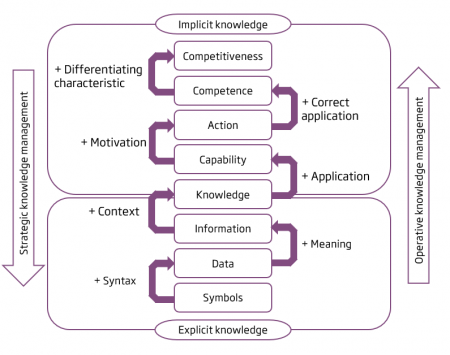
Definition of Knowledge Management and its Components
What is knowledge? And how would you explain it in the simplest possible way?
Here, using the example of a cook and his activities in the kitchen, the concept of the knowledge scale according to Klaus North is presented.

What does the term knowledge contain and what components does it consist of? Implicit and explicit knowledge, competence, capability, information and, finally, the concept of knowledge management and its possible practical application are presented in a familiar context.
🔦 Imagine a chef working in a restaurant who wants to offer a new section of vegetarian dishes on the menu.
The chef knows how to cook vegetables, but does not have much #knowledge on how to create tasty and well-balanced vegetarian dishes that appeal to diners.
To address this situation, the chef can apply knowledge management to gain the knowledge needed to create these dishes.
First, the chef can start by gathering #information on available plant-based ingredients and their nutritional properties.
Then, he/she can look for #data on diners’ preferences for vegetarian dishes and market demand in general.
Through this collection of information and data, the chef can acquire explicit #knowledge and better understand the context in which he/she is working.
After acquiring this knowledge, the chef can apply his #culinary skills and start experimenting with different ingredients and techniques to create tasty and well-balanced vegetarian dishes.
Eventually, he/she can share his/her knowledge with other chefs and staff members in the restaurant, which fosters collective knowledge management in the organisation.
Finally, by actively, consciously and systematically using the acquired knowledge, the chef can create successful vegetarian dishes and thus develop #competence on vegetarian cuisine, stand out with his dishes from the rest of the surrounding restaurants and gain over time a #competitive advantage for the restaurant.
Through operational and strategic knowledge management, the chef has acquired the necessary knowledge to create new dishes and improve the quality of the overall menu, which has led to the success of the business.


